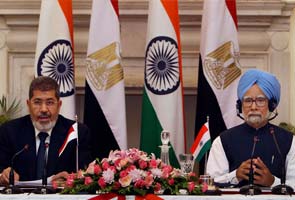 New Delhi, Mar 19: Egypt Tuesday pushed for India to join its ambitious Suez Canal corridor project as Indian Prime Minister Manmohan Singh and Egyptian President Mohamed Morsi met here for talks to forge closer cooperation in economic and other fields.
New Delhi, Mar 19: Egypt Tuesday pushed for India to join its ambitious Suez Canal corridor project as Indian Prime Minister Manmohan Singh and Egyptian President Mohamed Morsi met here for talks to forge closer cooperation in economic and other fields.Morsi, Egypt's first democratically elected president who came to India after a day-long visit to Pakistan, said he welcomed India's contribution in the Suez Canal corridor project that is aimed to become a bridge connecting Africa with Asia.
Speaking to the media after a meeting with Prime Minister Manmohan Singh, Morsi said the corridor project once ready would make Egypt a hub for India's exports to the West and boost Indian exports to $200 billion.
The 190-km corridor project aims to turn the Suez Canal banks into a global economic zone and earn billions of dollars in revenue for Egypt. The European Bank for Reconstruction and Development (EBRD) has offered to invest Euro one billion in the project.
Morsi said in his talks with Prime Minister Manmohan Singh both sides had agreed to reinforce bilateral relations in various areas, including political, economic, military, cultural and tourism and "agreed to promote ties till they reach the level of strategic partnership".
India offered to share its experience in the field of IT, renewable energy, services, electronics, small and medium enterprises, manufacturing and fertilizers. Both sides inked seven agreements, including five MoUs, in the field of cyber security, Information Technology.
India is setting up a solar energy project in a village in north Egypt and also setting up a centre of excellence in IT at the well known Al Azhar University.
Morsi, who is facing troubles back home with a court ordering cancellation of the April 22 parliamentary elections, thanked India and its people for support for his country post the 'Arab Spring' revolution two years ago.
He said bilateral trade, despite the political tumult in his country, had grown to $5.5 billion, growing $2.5 billion in the past one year alone. Morsi, who has brought along a high-level delegations comprising seven minister-level officials and top business heads, said Egypt was keen to attract more Indian investment.
Prime Minister Manmohan Singh said India "deeply appreciates" the fact that Morsi has undertaken a state visit to India despite his pressing domestic commitments. "This is a reflection of his personal commitment to our relationship," he said.
The prime minister conveyed India's full support to Morsi and "offered to share our experience as he ably leads his nation in building strong institutions and frameworks for democracy, social justice and inclusive economic development".
He said Egypt's location "as a bridge between Asia and Africa, astride a major global trade route, together with its skilled human resources, makes it an attractive business destination for India".
Both sides have agreed to foster productive partnerships in socio-economic development programmes, skill development, higher education, agriculture and health care and also agreed to enhance defence exchanges and cooperation.
On Palestine, Manmohan Singh conveyed India's support to the Palestinian cause and expressed deep appreciation for the role played by Egypt in trying to forge unity between the Palestinian groups - Hamas and Fatah -- and work towards a peaceful resolution.
On Syria, both sides condemned the violence and agreed on the urgent need for a peaceful resolution of all issues through dialogue.
Both sides also agreed to intensify efforts on issues that affect developing countries, and increase coordination in various international forums, including the United Nations, G-77 and the Non Aligned Movement.
India and Egypt are founders of the Non-Aligned Movement and the two countries shared a very close relationship till the sixties during the time of Indian prime minister Jawaharlal Nehru and Egyptain President Gamal Abdel Nasser. But the relationship cooled off thereafter and the 30-year rein of previous president Hosni Mubarak were not marked by close ties.
Morsi has been keen to take Egypt's foreign policy away from its pro-West orientation and shift the focus back to Asia and the developing world.





Comments
Add new comment